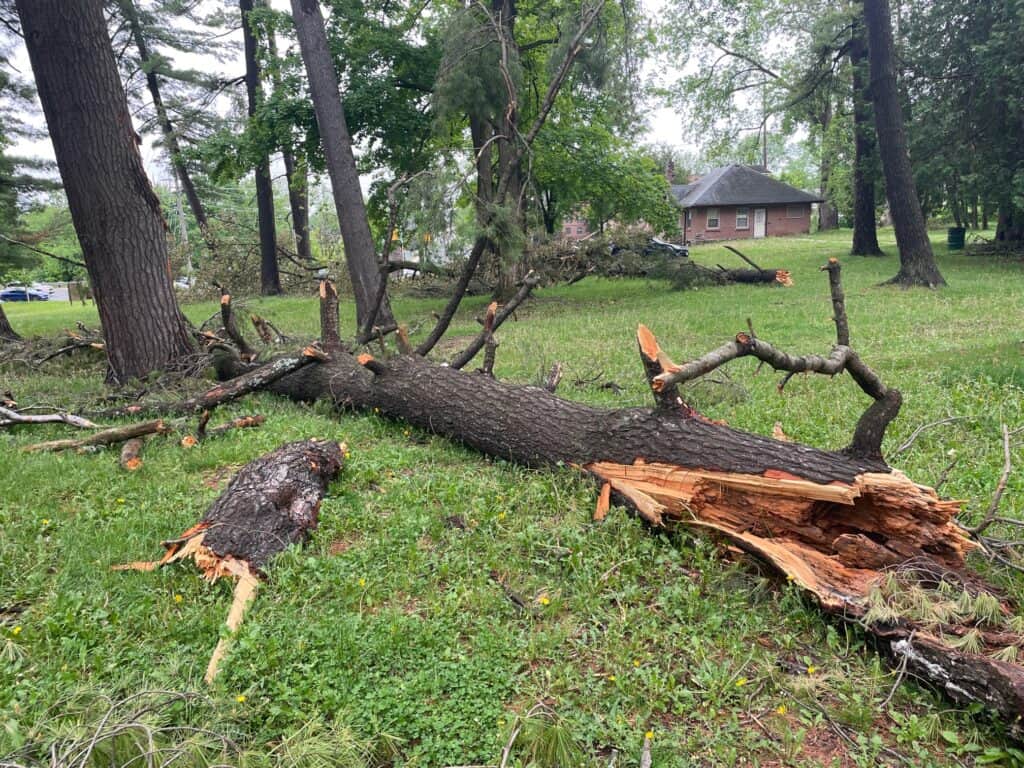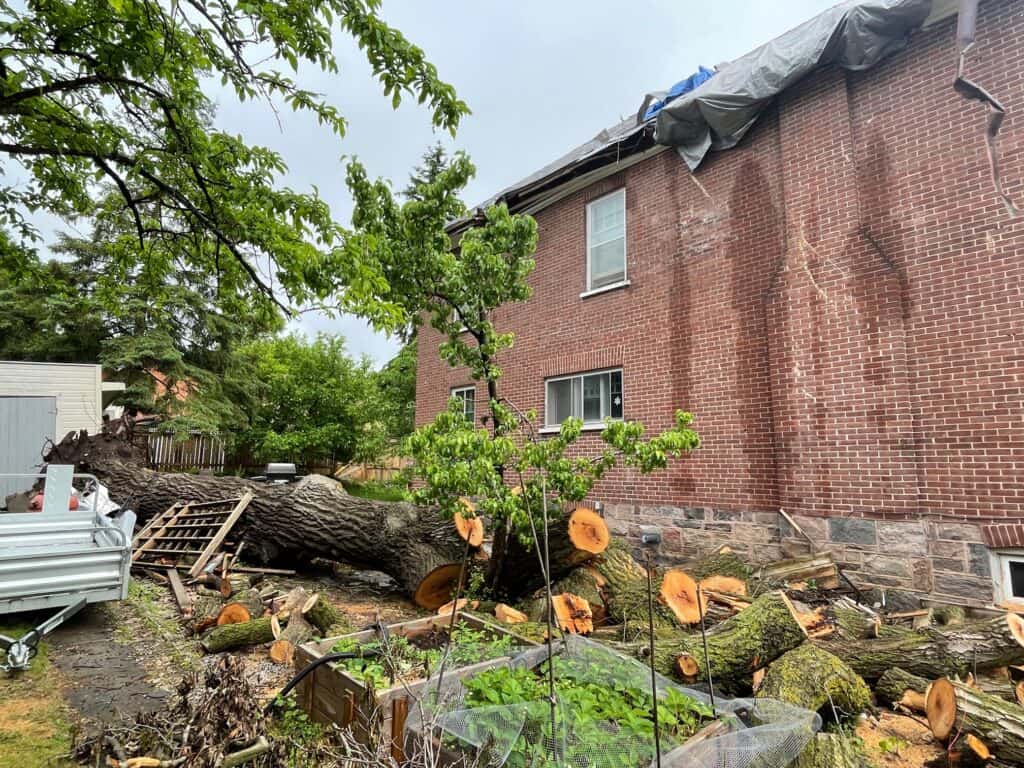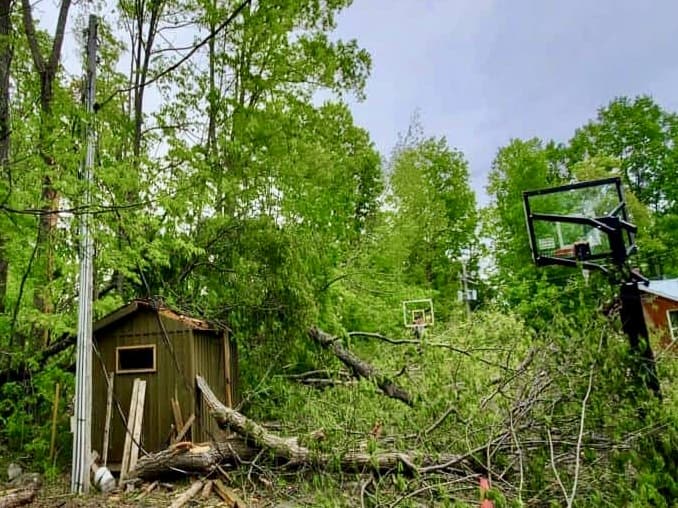May 21 a taste of all we stand to lose by refusing to commit to action on climate change
Peterborough Examiner – June 3, 2022 – by Drew Monkman
The devastating reality of climate change has once again unleashed itself on Peterborough and the Kawarthas. If the 100-year floods of 2002 and 2004 weren’t enough, the derecho that pummeled the area two weeks ago is a stark reminder that climate chaos is now a clear and present danger right here at home. As columnist Tricia Clarkson wrote in Peterborough This Week, “The deadly derecho windstorm that came out of nowhere on Saturday, May 21 will be forever etched in the minds of Peterborough residents as one of the worst storms they have ever experienced.”
In addition to extensive damage to buildings and infrastructure, the natural world took a terrible beating. Many Kawartha Land Trust trails and properties were especially hard hit as were parks in Peterborough. Numerous towering white pines in Jackson Park have been destroyed. Beautiful iconic trees that people have enjoyed for years are now simply memories. Trees and landscapes like these conferred both a sense of place and a source of peace and comfort for so many residents. What we experienced on May 21 was a horrific reminder of all we stand to lose by refusing to commit to all-out climate action.

An emotional toll
Seeing this kind of destruction of the natural world comes with a heavy emotional burden. My wife and I were away during the storm and only returned on Monday. We are now looking at a starkly different backyard. A gaping hole has opened up where two beautiful native cherry trees once stood. We’d planted them over 20 years ago and loved the blossoms, shade and privacy they provided. They were also among the favourite trees of the many birds that visit our yard.
In comparison to other people, however, we got off lightly. One particularly heartbreaking loss happened to a family on Dennistoun Avenue across from Inverlea Park. A gargantuan oak tree toppled and did extensive damage to the house. Not only are these people facing the stress and expense of a huge amount of repair work, but they’ve lost a much-loved tree that was close to 200 years old. It would have taken three people to wrap their arms around its trunk. This kind of “ecological grief,” or mourning for the land and its trees themselves, goes largely underappreciated. For so many of us, the mental toll of the climate emergency is a huge weight to bear. In some instances, it can even be similar to the mourning that a person would feel for a lost loved one. Countless people in Peterborough area are experiencing this painful loss right now.

The climate connection
It is often hard (but not impossible) to say with absolute certainty that an extreme weather event like a derecho wind storm is linked to climate change. What we can say, however, is that the factors required to form this kind of storm are coming together more often as the climate heats up. Derechos require high levels of heat and moisture in the planet’s atmosphere. They are often tied to heat domes like the one that swelled over eastern North America on May 21. With climate change, not only are we seeing atmospheric conditions like these more often, but they are creeping northward. We can therefore expect to see more storms like these in the future.
Camp Kawartha
As someone with a close connection to Camp Kawartha on Clear Lake, I am particularly saddened by the devastation it has experienced. As a teacher, I took my class there for years to participate in the wonderful environmental programing the camp offers.
According to executive director Jacob Rodenburg, a staggering 400 trees have been lost. There are now gaping holes torn in the forest canopy that shaded the camp for decades and was loved by countless campers and staff members. Many buildings, too, were heavily damaged and a least one cabin totally destroyed.

As Rodenburg reminded me though, “With every destruction there is rebirth, regrowth and renewal.” He is already thinking of ways to help regenerate the camp in the face of such a disaster. One way is through the creation of a “pocket forest”. By planting in layers it’s possible to create a huge amount of biodiversity in a small space. With cleanup and repairs now underway, Rodenburg expects that summer camp will be able to run this summer as planned. “We will show our campers, visitors, and community that people and nature can live together so that both may thrive.”
As a not-for-profit charity, Camp Kawartha could use your help during this challenging time. Donations would be greatly appreciated. Go to campkawartha.ca and click on How to Help. Click the donate button and select the fund “Renewing Camp Kawartha”. In the coming weeks when conditions are safe, they’ll also be looking for volunteers to help with the countless jobs that need to be done. If you have anything you can offer, they need your support. No experience is necessary.
As I write this column, the Ford Conservatives are on track to win another majority government. Despite the unprecedented climate chaos happening across the planet – and now in our own backyards – climate action and environmental protection barely register as priorities for this government. As citizens we need to let Queen’s Park know that we will no longer stand for policies that further jeopardize our physical, mental and financial well-being and that of the natural world. It’s hard to imagine how we could do this, however, beyond flooding the streets with protests and non-violent direct action. The fact that this hasn’t already happened at scale is a tragedy.
CLIMATE CHAOS UPDATE
New science: Slashing emissions of carbon dioxide by itself won’t be enough to prevent catastrophic global warming, a new study shows. However, if we simultaneously also reduce emissions of gases such as methane we could cut the rate of global warming in half by 2050 and give the world a fighting chance. The study is the first to assess the comparative impacts of cutting emissions of a broad range of climate pollutants versus targeting only carbon dioxide. The new research shows that focusing our efforts almost exclusively on cutting CO2 emissions can no longer prevent global temperatures from rising above pre-industrial levels by 1.5 degree centigrade. See https://tinyurl.com/bkx4e9be
Upcoming events: On June 13 at 7 pm, Scott McKinlay will be the guest speaker at 4RG Meets. In his talk entitled Climate Science Basics and Beyond, McKinlay will help clarify the facts and de-bunk the fiction around climate science. He will also outline the impacts of climate change, empower effective action, and hopefully nurture a sense of optimism. McKinlay is a lifetime naturalist, former physics and science teacher, and is currently on the board of For Our Grandchildren, a local climate action group. Register for this Zoom event by emailing 4rgmeets@gmail.com.
Carbon dioxide: The atmospheric CO2 level hit an all-time high last week. The reading for the week ending May 28 was 421.46 parts per million (ppm), compared to 418.76 ppm a year ago. The highest level deemed safe for the planet is 350 ppm. Rising CO2 means more climate chaos and severe storms ahead.
Take action: To see a list of ways YOU can take climate action, go to https://forourgrandchildren.ca/